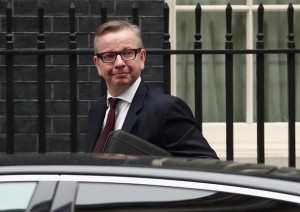Last Friday saw another round of inflationary gifts to teachers in England. As The Independent reported ,Tiffany bracelets, opera tickets – even a brace of pheasants – were given to teachers as the academic year drew to a close. But there was no doubting the gift that was most treasured by the vast majority of teachers: the removal of Michael Gove as Secretary of State for Education.
His demotion provoked a range of reactions in keeping with the actions of the most divisive head of schooling that I can remember. While Twitter nearly self-combusted with excitement from the rump of educators Gove had previously described as ‘the blob’, others were ‘saddened’. Sir Michael Wilshaw, boss of OFSTED , said he was “a great admirer of the Secretary of State, I think he’s been a transformative and radical minister of education.”

Well, radical certainly. Transformative also, if one sees transformation purely as a force of disruption. But while radicals disrupt, leaders lead. and Mr Gove showed himself to be singularly lacking in leadership skills. Great leaders don’t summarily dismiss the views of serious committed educators, branding them ‘enemies of promise’. Leaders don’t repeatedly snub invitations to speak at major teaching and union conferences. Leaders don’t brief against outspoken critics of their policies (as was done with teacher’s advocate Sir Ken Robinson – a simultaneously cowardly and dumb strategy). Most importantly, leaders do not alienate the very people they need to make transformation – real, sustainable transformation – stick.
For what it’s worth, I supported a number of Mr Gove’s initial disruptions. I believe we had too many quangos, and the controversial introduction of ‘free schools’ brought, and will continue to bring, some much-needed innovation into the system. And I honestly believe his intentions were well-meant – his own praiseworthy climb from real social disadvantage to the upper echelons of government drove him to seek that for every child not dealt a decent hand at birth.
But that’s where the ideological zealotry became his undoing. The sweeping changes he introduced seemed to be fuelled by a simplistic belief that, if only every child had the kind of education he had, they could achieve what he had achieved. Never mind that there are only so many upper-level administrative/managerial jobs to go around (and most of them go to privately-schooled alumni) – his annihilation of vocational pathways will probably mean that it’ll be impossible to find a tradesperson in England in 10 years time.
Never mind that many of his curriculum reforms were attempts to take us back to the needs of 1950s employers, instead of the needs of a 2020 enterprise freelance future.
Educators who tried to point any of these contradictions out, automatically became ‘enemies of promise’. Years of experience of teaching working-class kids wasn’t seen as a mine of experience to be utilised, but the root cause of the blight of ‘low expectations’. It was a neat sleight of hand, and for a while, it looked like it might even silence opposition.
Here was a man who was in a desperate hurry to change everything, all at once, perhaps conscious of the words of the man on the poster on the walls of his office:
“Give me four years to teach the children, and the seed I have sown will never be uprooted.”
Vladimir Lenin
The great unravelling, however, seemed to come from a number of failings:
A looming election and the polls showing Gove’s ‘toxicity’ to the teaching profession; the fall-out from the ‘Trojan Horse’ affair in Birmingham (as I blogged previously, whatever the outcome of the enquiry the department was implicated in any radicalisation in academies as they’re responsible for them); the very public fall-out with his own inspections agency…. it didn’t seem to occur to Mr Gove that the accumulation of so many opponents would have consequences.
His swift fall from grace seems to have been complete when, on the first day of his new job as Chief Whip, he managed to get stuck in the MPs toilet, while the government was losing a vote…..
So, into his shoes steps the virtually unknown Nicky Morgan. Ms Morgan went to a fee-paying school, practiced corporate law and became an MP four years ago. In other words, she knows nothing about education.
This may not be a bad thing – her first move has been to open the consultation around curriculum review to teachers, a step which drew gasps of admiration from union leaders. This is how far we had sunk as a profession, and how far Mr Gove had succeeded in denigrating teachers – that we’re now both grateful and surprised to be asked what we think about our daily work.
So, if I may, let me offer some advice to the new Secretary of State:
1. If you want to see improvement in the system, worry less about what is taught, and more about how it’s taught;
2. The hallmark of great leadership is the ability to listen to those who know more than you do – Nelson Mandela ran cabinet meetings by listening to every view in the room, before expressing his own. Your predecessor, when told that businessmen wanted to see student develop the ‘C’ skills (creativity, collaboration, communication, etc) is reported to have said ‘businessmen are talking out of their arses’. Don’t get stuck in the same intellectual toilet that he did – it doesn’t end well;
3. Mr Gove used his 4 years to radically re-structure the system. 9 months before an election, you’re probably not going to be allowed to change much, and teachers are crying out for a period of calm. That’s frustrating when you want to make an impact, but this isn’t about you. Swear a little hippocratic oath to yourself in Mr Gove’s much-loved Latin: Primum non nocere (“first, do no harm”). However, don’t be afraid to release teachers from the strictures and accountability that bind their hands, and deflate their spirits;
5. Visit as many schools as you can, and not just the ones that seem to fit your own ideology, as Mr Gove did. You could start with Barrowford Primary School where last week’s Headteacher’s letter to students went viral (who cares if bits of it were plagiarised?) There are many ways to create a successful school;
6. Acknowledge that educational discourse has become dangerously polarised and militaristic, forcing people to declare which side they’re on: progressives or traditionalists (see your OFSTED boss’s recent speech for a classic example). In reality, most teachers don’t see teaching practice in such stark polarities – trust them to use their professional judgement to use whatever work;
7. Finally – and I know this is asking a lot – if you prioritise students being engaged in their learning, above their academic achievements, you’ll find the results take care of themselves. I know this is a leap of faith, but I could show you hundreds of schools where this strategy has paid handsome dividends.
Good luck, in your new job. I’m delighted to see a change in leadership – not least because it means I’ll never have to blog about Michael Gove again.



A pleasure to read. An interesting ‘subversive’ streak runs through the article in its insight of the current state of things.